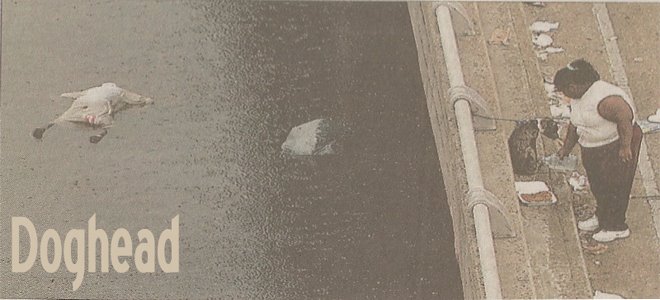
Excerpt from the sixth 'Dating Game' show
Pretty girl cheerleader: Bachelor Number One, one of my biggest
difficulties is spelling. How do you spell relief?
Bachelor number one: F-A-R-T
Pretty girl cheerleader (without batting an eyelash): I see. Bachelor
Number Two, what nationality are you?
Bachelor number two: Well, my father is Welsh, and my mother is Hungarian,
which makes me Well-Hung!
Pretty girl cheerleader: Well, aren't you the clever one? Okay, Bachelor
Number Three, what's the funniest thing you were ever caught doing when you
thought nobody was looking?
Bachelor number three: I was caught with a necktie around my dick.
Truth, afterall, is such a pejorative term. Some high brows amongst us would like to pour scorn on the likes of Norman Mailer and Truman Capote for their preference of storytelling over factual accuracies. But to me, truth runs deeper, all writing is a retelling of physical reality, even the most ardent journalist or committed memorist would come far, far off the mark of reality. But writing is a creative force, at its best it conjures ideas and images of reality so we can live a form of reality in our own heads. Capote and Mailer both tap into deeper truths of the world and the human condition by in part sidestepping the reality they faced.
Now, I'm not comparing Chuck Barris to either Mailer or Capote, but, the guy knows how to tell a fucking story. Barris is responsible for some of America's best loved/most loathed gameshows, depending on who you ask. What Confessions of a Dangerous Mind unleashed on the world was a revelation that he was also a CIA operative who had committed several assassinations during the cold war, and had been awarded a presidential medal of honour for his troubles. Largely it reads like a Robert Ludlum novel wrote by Larry David, and I mean that as high praise. It's hilarious in parts, but also has a good deal of intrigue and suspense. Barris is quite clearly a bit of an arse, but he's a likeable arse, and throughout his misadventures and misdeeds (which I can imagine are painfully true), you still root for the guy.
I left the hotel lobby and returned to the rue des Saints-Peres,
pretending to window shop, but always keeping my eyes on the green wooden doors. I saw windows filled with uncomfortable-looking Louis XIV chair, heavily framed oil paintings, and piles of twenty-four karat gold jewelry. I walked on. Kirkby and Slasky must have KGB watchdogs, I mused. The colonel wouldn't travel without them. So where were they? I scoured the street but saw nothing resembling Soviet henchmen. They probably weren't around because the colonel wasn't around. The act of attempting to trap two individuals in one suitable place was a pain in the ass. Perhaps impossible.I turned back toward the white cement building, and instantly froze. Harry Kirby and Colonel Slasky had stepped out onto the rue des Saints-Peres. I watched the two men look up and down the street. They saw me, but I apparently meant nothing to them. Three women shoppers jostled the two men as they passed them on the narrow pavement. I watched the shoppers say "Excuse me," and Kirby smile. Slasky turned his back to me. He was looking toward the boulevard St.Germain. For what? A car? His henchmen? The women continued down the pavement toward me.
I moved quickly through the shoppers, drawing my silencer-equipped automatic out of my belt as I walked. I bumped into Colonel Slasky, spun him around, and shot him three times in the left side of his chest. I turned and shot Harry Kirby once in the face and twice in the chest. Slasky had fallen onto his side on the pavement. I bent over and put a bullet through his temple. Kirby was on his knees. I placed the end of the silencer in his ear and pulled the trigger. A small truck screeched to a stop. I crossed the street and ran toward the boulevard St.Germain. If there were screams and shouts and horns blowing, I didn't hear them.
I returned to my hotel room, locked and bolted the door, and positioned an armchair so that I could see the entire room. I checked the Ruger .22-caliber automatic and silencer that I had used on the rue des Saints-Peres. It was a funny-looking gun. Most of its barrel was the silencer. The boys at the Company called it an "assassination gun." I ejected the old magazine, oiled the automatic lightly, wiped it clean with a rag, popped in a full magazine, and rested the gun on my lap. I sat that way until dawn.
